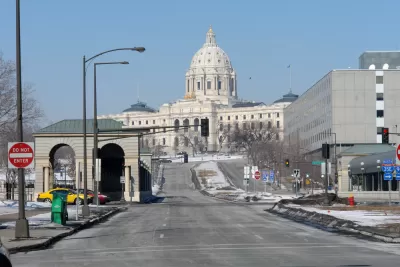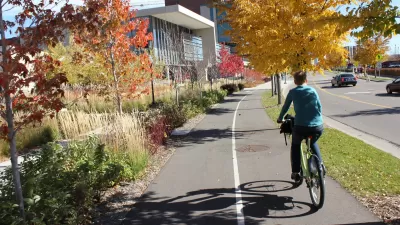Minneapolis and St. Paul are celebrating their newfound local control on matters of traffic safety be reconsidering the speed limits on city-owned streets and roads.

"The compromises forged at the end of last year’s [2019] legislative session included a new law that allows Minnesota cities to set their own speed limits on city streets," according to an article by Bill Lindeke, and St. Paul is one of the cities moving to take advantage of their newfound local control.
"In both Minneapolis and Saint Paul, the next step is one where cities, on their streets anyway, can begin to set their own pace, and use street regulations to accomplish civic goals," explains Lindeke.
The article includes an explanation of the 85th percentile rule, describing the status quo for determining speed limits as perverse.
Especially in cities, the 85th percentile rule can work in perverse ways. At its extremes, the principle rewards drivers who speed by changing the rules. If enough people break the law, the rule simply changes the law to accommodate them. For decades, that’s been how speed limits were set throughout the state.
In St. Paul, according to Lindeke, engineers are considering a new process for thinking about which speed limits are appropriate for which streets in the absence of the 85th percentile's precedent.
As reported from Minneapolis earlier this year, St. Paul is not alone in seeking lower speed limits now that the state has relaxed its powers of preemption.
FULL STORY: St. Paul is rethinking its speed limits

Alabama: Trump Terminates Settlements for Black Communities Harmed By Raw Sewage
Trump deemed the landmark civil rights agreement “illegal DEI and environmental justice policy.”

Planetizen Federal Action Tracker
A weekly monitor of how Trump’s orders and actions are impacting planners and planning in America.

The 120 Year Old Tiny Home Villages That Sheltered San Francisco’s Earthquake Refugees
More than a century ago, San Francisco mobilized to house thousands of residents displaced by the 1906 earthquake. Could their strategy offer a model for the present?

In Both Crashes and Crime, Public Transportation is Far Safer than Driving
Contrary to popular assumptions, public transportation has far lower crash and crime rates than automobile travel. For safer communities, improve and encourage transit travel.

Report: Zoning Reforms Should Complement Nashville’s Ambitious Transit Plan
Without reform, restrictive zoning codes will limit the impact of the city’s planned transit expansion and could exclude some of the residents who depend on transit the most.

Judge Orders Release of Frozen IRA, IIJA Funding
The decision is a victory for environmental groups who charged that freezing funds for critical infrastructure and disaster response programs caused “real and irreparable harm” to communities.
Urban Design for Planners 1: Software Tools
This six-course series explores essential urban design concepts using open source software and equips planners with the tools they need to participate fully in the urban design process.
Planning for Universal Design
Learn the tools for implementing Universal Design in planning regulations.
Clanton & Associates, Inc.
Jessamine County Fiscal Court
Institute for Housing and Urban Development Studies (IHS)
City of Grandview
Harvard GSD Executive Education
Toledo-Lucas County Plan Commissions
Salt Lake City
NYU Wagner Graduate School of Public Service





























